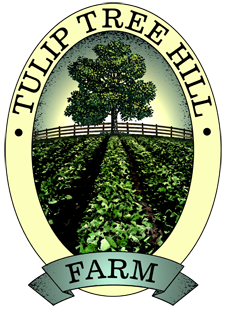 Here is an overview of most of my garden. From left to right you can see the "three sisters" planting of field corn, beans, and melons. You can also see salad greens, sunflowers, potatoes, mustard, tomatoes and peppers (in the red plastic).
Here is an overview of most of my garden. From left to right you can see the "three sisters" planting of field corn, beans, and melons. You can also see salad greens, sunflowers, potatoes, mustard, tomatoes and peppers (in the red plastic). The three sisters is something I've read about but never tried before. You plant the corn first, four to a hill, and when it is 4" tall plant pole beans in between the corn plants. Then in between the corn/bean hills, you plant melons, squash, pumpkins, etc., two to a hill. The idea is that the corn will support the beans as they grow, the beans will add nitrogen to the soil, and the squash will shade the ground to minimize weeds. It's an interesting concept and one which will be fun to watch play out. I've mulched the three sisters heavily in between the hills with cardboard covered up with horse manure/bedding and then topped it off with wood chips from last year. The weeds don't stand a chance (hopefully).
The field corn is from seed saved from last year's planting. It worked out great last year - the animals got some for treats and I got some for corn meal - which was very good, by the way. I encourage you to try your hand at growing it for yourself - but get an heirloom variety so you can save your own seed.
The beans for three sisters were: Emerite pole bean, your typical french green bean; Chinese Red Noodle bean, an oddball that is supposed to get 18" pods that are bright red; and Vermont Cranberry bean, a nice red spotted bean that's good for drying and using for soups and chili. The melon/squash component consists of Banana melons, Thai Golden melons, a Pepino melon, french "Cinderella" pumpkins (Rouge Vif D'Etampes), lemon cucumbers, a plain old slicing cucumber, and a couple zucchini.
Salad greens, red beets, onions and sunflowers are next to the three sisters. The plan is that the greens will be done by the time the squash becomes rampant, and the sunflowers will be well above it all. I've been eating a LOT of salad lately.
Potatoes: two white varieties and a blue variety. Supposedly the blue one stays that color even through cooking. Should be interesting. This picture was taken last week before mulching was started. At this point, I have about half the potatoes mulched, first laying down a thin layer of newspaper and topping it off with the manure and wood chips.
Mustard: Brown, black, and white. They're looking good, so hopes are high for home made grainy mustard.
Tomatoes: Limony, John Baer, Wapsipinicom, Black Sea Man, Orange Strawberry, Green Zebra, and Mexican Midget - all heirloom varieties.
Peppers: Early Sunsation, Satsuma, Mandarin, Hungarian, Jalapeno, Cayenne, and Lemon Drop.
There is also a row of zinnias and cosmos for cutting, a couple of cotton plants, a few carrots, Danish Ballhead cabbage, peanuts, and a few roselle, a relative of hibiscus from asia. Roselle is what gave the zing to red zinger tea. I wonder if it will be good in a blend with mint.
In what was supposed to be the oats bed, I put in indian corn, broom corn, popcorn, and sweet corn. Just a little of each. The oats were a failure, hardly any germinated, so I 'tilled them under for the sake of the corn contingent.
Next to the corn, the wheat is actually making a comeback! Not a nice, full, dense stand, but hopefully enough to harvest. It is making seed heads now and so really does look like wheat.
So now all the planting is done. More mulching is next on the list and then it will "just" be keeping ahead of the weeds and of course, enjoying the harvest!




2 comments:
Wow, you put my gardening to shame! How do you find time to do all that and your art, too?
Truth be told, I have use of a large rototiller which helps tremendously in the preparation of the garden. When I'm preparing and planting, I start as early in the season as possible and do just a little bit every day. After the garden is prepared and planted, I probably spend no more than 1/2 hour per day, usually first thing in the morning before breakfast. It's my favorite time of the day, peaceful, quiet, and cool, often before the rest of the world has woken up. It is, "In the cool of the day".
Post a Comment